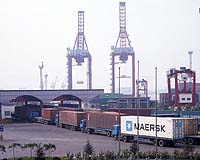| . |  |
. |
Washington (AFP) Dec 30, 2009 The United States has ratcheted up trade tensions with China following a "final" decision Wednesday to slap punitive duties on imported Chinese steel pipes targeted for unfair subsidies. Despite warnings by China, the US International Trade Commissionsion (ITC) decided Wednesday that the subsidized pipes adversely impacted the domestic steel industry, paving the way for the Commerce Department to impose countervailing duties of up to nearly 16 percent on the pipes. This is the largest countervailing duty case filed against China, based on the value of trade, lawyers said. Beijing had "strongly" opposed the unfair subsidy claims investigated by Washington since early 2009, calling them "blind accusations." From 2006 to 2008, imports of such Chinese pipes increased by a massive 203 percent. They were valued at 2.6 billion dollars last year. The ruling by the ITC, an independent federal agency, came amid rising trade friction between the United States and China even as they depend on each other for their economic survival. China is highly dependent on US export markets and invests the bulk of its 2.2 trillion dollars in foreign exchange reserves in US Treasury bonds. The United States receives a large volume of low-cost imports from China while Beijing's Treasury bond holdings virtually finance the snowballing US budget and current account deficits. "The bargaining strengths of the two countries are finely balanced but this sets up a dangerous game of chicken that could easily spin out of control if the desire to pander to domestic audiences trumps rational collective policymaking in one or both countries," warned Eswar Prasad, a professor at Cornell University. "Many of the thorny issues in the bilateral relationship between these two countries can be traced to the evolution of the rising bilateral trade deficit that the US runs with China," said Prasad, an ex-head of the International Monetary Fund's China Division. US lawmakers and several industry groups claim that Beijing was artificially weakening its yuan currency value to boost its export competitiveness, a factor they blamed on the record 268 billion dollar trade deficit with China in 2008. When President Barack Obama returned home from a November visit to Beijing without any pledge from China to make its yuan flexible, both Republican and Democratic lawmakers sent a letter to the US authorities calling for an investigation into "China's currency manipulation." The letter was seen by lawmakers as a potential first step in a process that could lead to significant sanctions in the form of punitive duties on Chinese imports. The United States is not alone in scrutinizing Chinese products for possible trade violations. "With China's currency not appreciating, there is another way that trade partners have addressed the issue," said Andrew Busch, a currency and public policy strategist at BMO Capital Markets. He said 19 countries and regions had launched 103 trade-related investigations against Chinese products and "both the number of the cases and the money involved was at a record high." In September, the United States announced it would slap duties on Chinese-made tires to protect local US industry, sparking the first major trade dispute in Obama's first year in office. An angry Beijing lodged a complaint at the World Trade Organization and retaliated by launching a probe into possible unfair trade practices involving imports of US car products and chicken meat. Beijing charged that Washington's move violated WTO rules but Obama has denied that it amounted to protectionism. The Commerce Department pursued an investigation into the steel pipes case after complaints from various US industry groups, including the United States Steel Corporation, as well as the largest industrial union in North America. The American Iron and Steel Institute, an industry group, said the ITC decision was "an important step" toward allowing domestic steel pipe producers "to compete on a level playing field unhindered by unfair and injurious Chinese trade practices. "At a time when the nation is struggling with double-digit unemployment, full and strict enforcement of our laws against dumped and subsidized imports of steel and other manufactured products from China is essential to maintaining a viable US manufacturing sector in the United States," said the institute. The ITC will forward in writing the formal determination to the Commerce Department "within 10 days," an official told AFP, speaking on condition of anonymity. "This is the final piece in the puzzle," the official said.
Share This Article With Planet Earth
Related Links Global Trade News
 China likely to become top global exporter in 2009: govt
China likely to become top global exporter in 2009: govtBeijing (AFP) Dec 28, 2009 China is likely to overtake Germany as the world's largest exporter in 2009, despite a sharp fall in shipments as the global downturn took its toll, a high-ranking trade official has said. The country's share of global trade is expected to exceed nine percent this year, up from 8.86 percent in 2008, Vice Commerce Minister Zhong Shan said at a forum here on Sunday. "China will probably su ... read more |
|
| The content herein, unless otherwise known to be public domain, are Copyright 1995-2009 - SpaceDaily. AFP and UPI Wire Stories are copyright Agence France-Presse and United Press International. ESA Portal Reports are copyright European Space Agency. All NASA sourced material is public domain. Additional copyrights may apply in whole or part to other bona fide parties. Advertising does not imply endorsement,agreement or approval of any opinions, statements or information provided by SpaceDaily on any Web page published or hosted by SpaceDaily. Privacy Statement |